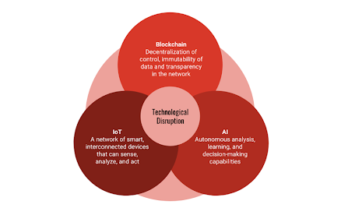As we approach 2025, the landscape of blockchain technology continues to evolve at an unprecedented pace. Initially known for its role in powering cryptocurrencies like Bitcoin, blockchain has expanded its applications across various industries, including finance, healthcare, supply chain, and more. This article explores the future of blockchain technology in 2025, highlighting key trends, potential challenges, and its transformative impact on various sectors.
Understanding Blockchain Technology
Blockchain technology is a decentralized, distributed ledger system that allows multiple parties to securely record and verify transactions without the need for a central authority. Each transaction is grouped into a block, which is then added to a chain of previous transactions, creating a secure and transparent record. This technology offers several advantages, including enhanced security, increased transparency, and reduced costs.
Key Trends Shaping Blockchain in 2025
-
Increased Adoption Across Industries
By 2025, we can expect to see widespread adoption of blockchain technology across various sectors. Industries such as finance, healthcare, and supply chain management are already exploring its potential. For instance, financial institutions are leveraging blockchain for faster and more secure cross-border payments, while healthcare providers are using it to securely share patient data.
-
Interoperability Between Blockchains
As the number of blockchain networks continues to grow, interoperability will become a critical focus. In 2025, we anticipate the development of protocols that enable different blockchains to communicate and share data seamlessly. This will enhance collaboration between organizations and improve the overall efficiency of blockchain applications.
-
Regulatory Developments
As blockchain technology matures, regulatory frameworks will evolve to address the unique challenges it presents. By 2025, we expect to see clearer regulations governing the use of blockchain in various industries. Governments and regulatory bodies will work to create guidelines that promote innovation while ensuring consumer protection and compliance.
-
Decentralized Finance (DeFi) Growth
Decentralized finance (DeFi) has gained significant traction in recent years, and by 2025, it is expected to become a mainstream financial system. DeFi platforms leverage blockchain technology to offer financial services without intermediaries, such as banks. This shift will democratize access to financial services, allowing individuals to borrow, lend, and trade assets more efficiently.
-
Enhanced Security Features
As cyber threats continue to evolve, the security features of blockchain technology will also advance. By 2025, we can expect to see the implementation of more robust security measures, such as advanced cryptographic techniques and multi-signature wallets. These enhancements will help protect sensitive data and transactions, making blockchain a more secure option for businesses and individuals alike.
-
Integration with Internet of Things (IoT)
The integration of blockchain technology with the Internet of Things (IoT) will create new opportunities for automation and efficiency. By 2025, we anticipate that blockchain will play a crucial role in securing IoT devices and enabling secure data sharing between them. This integration will enhance supply chain management, smart cities, and other applications that rely on connected devices.
-
Tokenization of Assets
Tokenization refers to the process of converting physical or digital assets into digital tokens on a blockchain. By 2025, we expect to see a significant increase in the tokenization of assets, including real estate, art, and intellectual property. This trend will enable fractional ownership, making it easier for individuals to invest in high-value assets and increasing liquidity in various markets.
-
Sustainability and Green Blockchain Initiatives
As concerns about climate change grow, the demand for sustainable practices in technology will rise. By 2025, we anticipate that blockchain technology will increasingly focus on sustainability. Initiatives aimed at reducing the energy consumption of blockchain networks, such as transitioning to proof-of-stake consensus mechanisms, will become more prevalent.
-
Education and Awareness
As blockchain technology becomes more mainstream, education and awareness will play a crucial role in its adoption. By 2025, we expect to see an increase in educational programs and resources aimed at helping individuals and businesses understand the benefits and applications of blockchain. This knowledge will empower more people to leverage blockchain technology in their operations.
-
Challenges and Considerations
Despite its potential, blockchain technology faces several challenges that must be addressed. Scalability, energy consumption, and regulatory compliance are just a few of the issues that need to be tackled. By 2025, it will be essential for developers, businesses, and regulators to collaborate in finding solutions to these challenges to unlock the full potential of blockchain technology.
Conclusion
The future of blockchain technology in 2025 holds immense promise, with the potential to transform various industries and create new opportunities for innovation. As we move forward, the emphasis on interoperability, security, and sustainability will shape the development of blockchain applications. By embracing these trends and addressing the challenges, businesses and individuals can harness the power of blockchain technology to drive efficiency, transparency, and trust in their operations. The journey towards a more decentralized and secure future is just beginning, and those who adapt to these changes will be well-positioned to thrive in the evolving landscape of blockchain.




